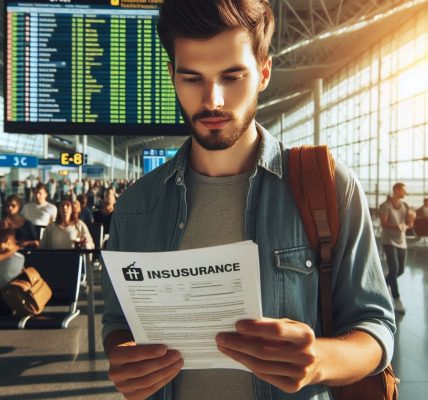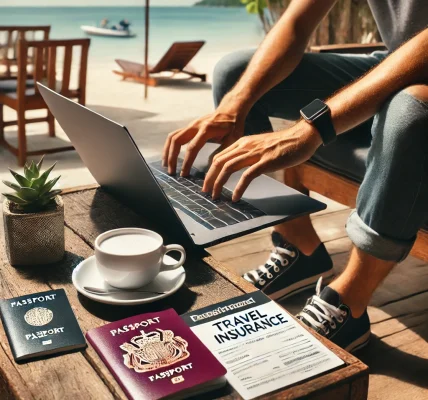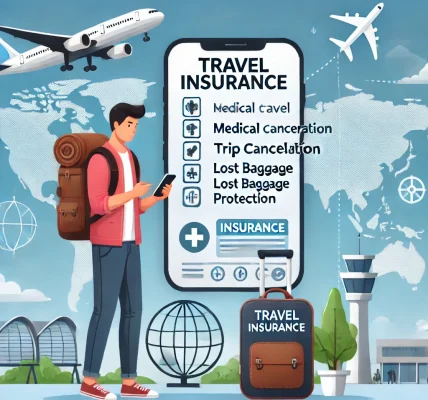Introduction
Traveling alone is an exciting adventure that offers independence, self-discovery, and the freedom to explore new places on your terms. However, solo travelers also face unique risks, such as medical emergencies, theft, and travel disruptions. That’s where travel insurance becomes a vital safety net.
In this guide, we’ll explore why travel insurance is essential for solo travelers, what it covers, how to choose the best policy, and expert tips to stay safe on your journey.
Why Do Solo Travelers Need Travel Insurance?
Unlike group travelers, solo travelers don’t have companions to rely on in emergencies. Here’s why travel insurance is crucial:
1. No Backup Support in Emergencies
If you get sick or injured abroad, you may have no one to help you navigate hospitals or arrange transport back home. Travel insurance provides 24/7 assistance services for medical emergencies.
2. Protection Against Theft & Scams
Solo travelers are often targeted by pickpockets and scams. Travel insurance can reimburse you for stolen money, passports, or valuable items.
3. Coverage for Trip Cancellations & Delays
If you have to cancel or delay your trip due to illness, a family emergency, or unforeseen events, travel insurance helps recover non-refundable expenses.
4. Emergency Evacuation Assistance
In case of natural disasters, political unrest, or medical emergencies, travel insurance covers evacuation and repatriation costs.
5. Peace of Mind for Family & Loved Ones
Knowing that you’re insured can reassure your family back home, allowing you to travel with confidence.
What Does Travel Insurance Cover for Solo Travelers?
Most travel insurance policies include the following essential coverages:
1. Medical Emergencies & Hospitalization
- Covers doctor visits, hospital stays, emergency surgeries, and medication.
- Some policies also include emergency dental treatment.
2. Emergency Medical Evacuation & Repatriation
- Covers the cost of medical transport to the nearest hospital or back home if necessary.
3. Trip Cancellation & Interruption
- Reimburses non-refundable trip expenses if you need to cancel or cut short your trip due to medical issues, family emergencies, or unforeseen events.
4. Lost, Stolen, or Delayed Baggage
- Compensation for lost or stolen luggage, passport, or essential items.
- Covers delayed baggage essentials like clothing and toiletries.
5. Travel Delays & Missed Connections
- Covers hotel stays, meals, and rebooking fees due to flight delays or missed connections.
6. Personal Liability & Legal Assistance
- Covers legal expenses if you accidentally cause injury or property damage abroad.
What’s Not Covered?
Travel insurance policies typically exclude:
- Pre-existing medical conditions (unless specifically included)
- Accidents due to reckless behavior, extreme sports, or alcohol/drug use
- Lost items due to negligence
- Traveling to high-risk destinations under government travel warnings
Always read the fine print of your policy to understand exclusions before purchasing.
How to Choose the Best Travel Insurance Plan for Solo Travel
1. Compare Multiple Insurance Providers
Look for providers with strong customer reviews, 24/7 assistance, and global coverage.
2. Choose Comprehensive Medical Coverage
Ensure the policy includes hospitalization, medical evacuation, and repatriation.
3. Consider Adventure & Sports Coverage
If you plan on hiking, diving, or other adventure activities, check if your policy covers them.
4. Opt for a Policy That Covers Theft & Fraud
Pick a policy that protects against stolen cash, passports, and digital fraud.
5. Check COVID-19 & Pandemic Coverage
Ensure your policy covers COVID-19-related medical expenses and trip cancellations.
Solo Travel Safety Tips
1. Keep Copies of Important Documents
- Store digital copies of your passport, insurance details, and emergency contacts in a secure cloud storage.
2. Stay Connected with Family & Friends
- Share your itinerary with someone you trust and check in regularly.
3. Avoid Overpacking & Carry Minimal Valuables
- Travel light and keep important belongings secured in a money belt or anti-theft backpack.
4. Research Local Emergency Contacts
- Know the nearest hospitals, embassies, and emergency numbers for your destination.
5. Be Cautious with Public Wi-Fi & Scams
- Use a VPN to protect your data and be aware of common tourist scams.
Cost of Travel Insurance for Solo Travelers
The cost of travel insurance depends on:
- Trip Duration: Longer trips cost more.
- Destination: Countries with high medical costs have higher premiums.
- Coverage Limits: More comprehensive plans cost more but provide better protection.
- Age & Health Condition: Older travelers may pay higher premiums.
On average, solo travel insurance costs 4-8% of the total trip expenses.
Top Travel Insurance Providers for Solo Travelers
Some recommended travel insurance companies include:
- World Nomads – Great for backpackers and adventure travelers.
- Allianz Travel Insurance – Strong medical and trip cancellation coverage.
- SafetyWing – Budget-friendly option for digital nomads.
- AXA Assistance – Comprehensive global travel protection.
Always compare policies and read the fine print before making a purchase.
Final Thoughts
Solo travel is an incredible experience, but it comes with risks. Having the right travel insurance ensures you’re covered in case of emergencies, giving you the freedom to explore without worry.
Before you set off, compare policies, understand coverage details, and follow safety tips to make the most of your solo adventure.



